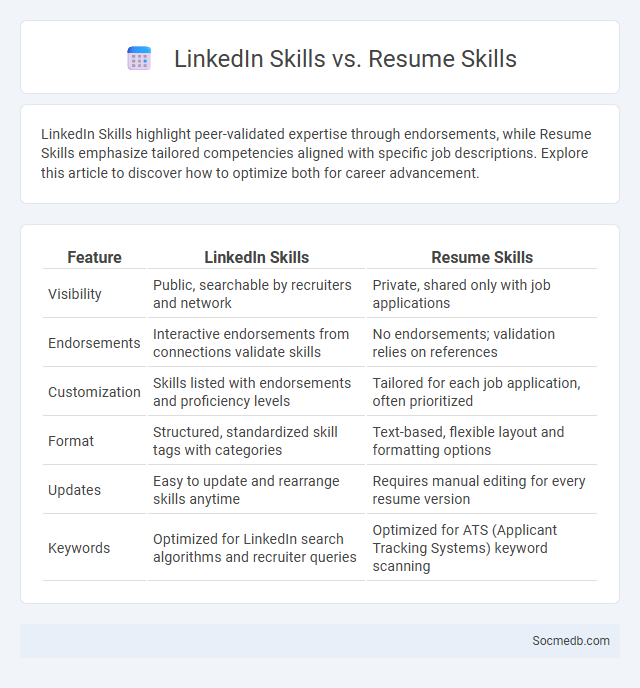
Photo illustration: LinkedIn Skills vs Resume Skills
LinkedIn Skills highlight peer-validated expertise through endorsements, while Resume Skills emphasize tailored competencies aligned with specific job descriptions. Explore this article to discover how to optimize both for career advancement.
Table of Comparison
| Feature | LinkedIn Skills | Resume Skills |
|---|---|---|
| Visibility | Public, searchable by recruiters and network | Private, shared only with job applications |
| Endorsements | Interactive endorsements from connections validate skills | No endorsements; validation relies on references |
| Customization | Skills listed with endorsements and proficiency levels | Tailored for each job application, often prioritized |
| Format | Structured, standardized skill tags with categories | Text-based, flexible layout and formatting options |
| Updates | Easy to update and rearrange skills anytime | Requires manual editing for every resume version |
| Keywords | Optimized for LinkedIn search algorithms and recruiter queries | Optimized for ATS (Applicant Tracking Systems) keyword scanning |
Understanding LinkedIn Skills: What Sets Them Apart
LinkedIn skills differentiate your profile by showcasing specific competencies validated by endorsements, enhancing your professional credibility. These skills are strategically categorized to align with industry standards, helping recruiters identify your expertise quickly. Leveraging LinkedIn skills effectively increases your visibility in search results and strengthens your professional network.
Resume Skills Explained: Crafting a Powerful Skillset
Mastering social media skills such as content creation, audience engagement, and analytics interpretation significantly enhances a resume's appeal to employers. Highlighting proficiency in platforms like LinkedIn, Instagram, and Twitter demonstrates adaptability and digital marketing acumen. Strong communication, creativity, and data-driven decision-making are essential skills that boost visibility and effectiveness in social media roles.
Key Differences Between LinkedIn Skills and Resume Skills
LinkedIn skills emphasize endorsements and social proof, enabling professionals to showcase abilities validated by peers, whereas resume skills present a curated list tailored to specific job applications. LinkedIn allows dynamic updates and algorithm-driven recommendations, enhancing visibility and networking opportunities, while resumes remain static documents focused on format and concise presentation. The platform facilitates ongoing skill validation through endorsements and endorsements frequency, contrasting with the one-time presentation of skills on resumes.
The Role of Endorsements on LinkedIn Skills
Endorsements on LinkedIn skills significantly enhance a user's professional credibility by showcasing third-party validation from peers and colleagues. These endorsements improve profile visibility in search results and attract potential employers or clients by highlighting proven expertise in specific areas. Leveraging endorsements strategically can strengthen networking opportunities and increase trust within industry-related communities on LinkedIn.
How ATS (Applicant Tracking Systems) Impact Resume Skills
Applicant Tracking Systems (ATS) significantly shape the way resumes are crafted by filtering and ranking candidates based on keyword relevance, emphasizing the inclusion of specific skills aligned with job descriptions. Social media insights and digital skill endorsements are increasingly integrated into ATS algorithms, enhancing the evaluation of candidates' competencies through validated online profiles. Optimizing resumes with ATS-targeted keywords and leveraging social media validations can improve job seekers' visibility and chances of advancing in the recruitment process.
SEO Principles for LinkedIn and Resume Skills Optimization
Optimizing LinkedIn profiles for SEO involves incorporating relevant industry keywords, crafting compelling headlines, and emphasizing measurable achievements to enhance search visibility. Resume skills optimization requires aligning skills sections with targeted job descriptions, using standardized terminology, and integrating action verbs to pass applicant tracking systems (ATS). Strategic keyword placement in both LinkedIn summaries and resumes maximizes discoverability by recruiters and hiring algorithms.
Customizing Skills for Different Job Applications
Customizing skills for different job applications on social media enhances profile visibility and relevance to specific employers. Highlighting industry-specific keywords and achievements tailored to each role improves engagement with recruiters and algorithms on platforms like LinkedIn. This targeted approach increases the likelihood of securing interviews and job offers by demonstrating precise qualifications and expertise aligned with job requirements.
Common Mistakes in Presenting Skills on LinkedIn and Resumes
Common mistakes in presenting skills on LinkedIn and resumes include using generic terms instead of specific keywords aligned with industry standards and job descriptions, which reduces visibility to recruiters and applicant tracking systems (ATS). Overloading profiles with too many unrelated skills dilutes professional focus, while failure to quantify achievements or demonstrate skill application undermines credibility and impact. Optimizing skill sections with targeted, measurable competencies tailored to desired roles enhances professional appeal and increases opportunities for engagement.
Strategies for Optimizing Both LinkedIn and Resume Skills
Optimizing LinkedIn and resume skills requires aligning keywords with industry-specific jargon and integrating quantifiable achievements to enhance credibility. Leveraging LinkedIn's skill endorsements alongside endorsements from colleagues reinforces expertise, while tailoring resume skills to match job descriptions increases applicant tracking system (ATS) compatibility. Consistent updates and targeted customization ensure a cohesive professional brand across both platforms.
Best Practices for Showcasing Skills to Attract Recruiters
Highlighting relevant accomplishments with quantifiable results on social media profiles significantly increases visibility to recruiters. Consistent use of industry-specific keywords and professional hashtags enhances searchability and ensures content aligns with trending topics in one's field. Engaging with industry leaders through comments, shares, and endorsements fosters a credible online presence that attracts recruiter attention.
 socmedb.com
socmedb.com